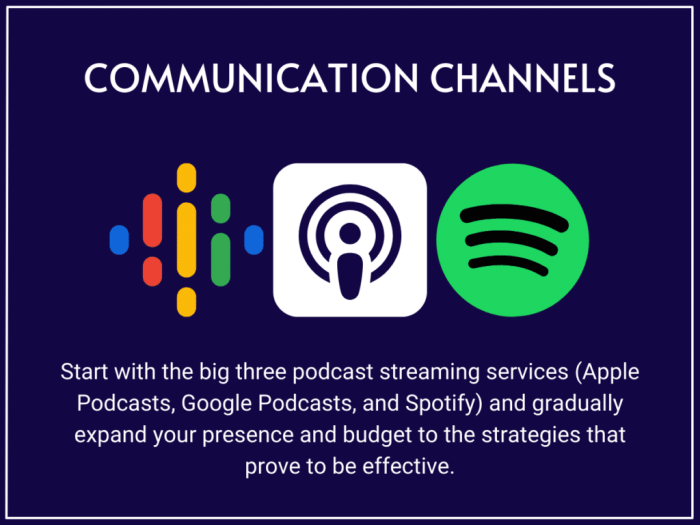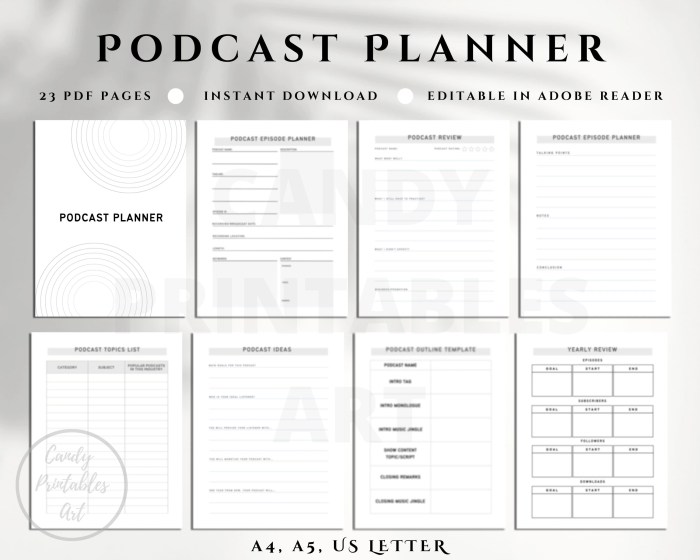Developing a Podcast Content Plan: Crafting Success in the Audio Realm sets the stage for a journey into the intricate world of podcast creation. From defining the plan to setting goals and promoting episodes, this guide will take you through the essential steps to make your podcast shine.
Get ready to dive into the nitty-gritty of podcast content planning, where creativity meets strategy in the coolest way possible.
Define Podcast Content Plan
A podcast content plan is a roadmap that Artikels the topics, themes, and structure of episodes for a podcast. It serves as a guide for the content creators to stay organized, consistent, and engaging with their audience. Having a well-developed podcast content plan is crucial for maintaining quality, relevance, and audience retention.
Key Components of a Well-Developed Podcast Content Plan
- Determine the target audience and their interests to tailor content accordingly.
- Create a content calendar with episode topics, guests, and release dates.
- Artikel episode formats, segments, and overall flow for consistency.
- Research and prepare engaging and informative content for each episode.
- Incorporate audience feedback and analytics to continuously improve the content plan.
Benefits of Having a Structured Content Plan for a Podcast
- Keeps content creators organized and on track with episode production.
- Helps maintain consistency in quality and delivery for the audience.
- Increases audience engagement and retention with planned and relevant content.
- Provides a framework for monetization opportunities through sponsorships or partnerships.
- Allows for easier collaboration with guests, co-hosts, and production team members.
Research and Audience Analysis: Developing A Podcast Content Plan
Research and audience analysis play a crucial role in developing a successful podcast content plan. By understanding the interests, preferences, and demographics of your target audience, you can tailor your content to meet their needs effectively.
Importance of Conducting Research
Research is essential for podcast content planning as it helps you gather valuable insights into what topics are trending, what your audience is looking for, and how to differentiate your podcast from others in the same niche. By conducting thorough research, you can identify gaps in the market, understand audience behavior, and create content that resonates with your listeners.
- Utilize research tools like Google Planner or SEMrush to identify popular topics within your niche.
- Conduct surveys or polls on social media platforms to gather feedback from your audience.
- Analyze competitors’ podcasts to identify successful content strategies and areas for improvement.
Influence of Audience Analysis on Content Plan
Audience analysis is crucial for shaping your content plan as it helps you create content that is relevant and engaging for your target listeners. By understanding your audience’s preferences, behaviors, and demographics, you can tailor your content to meet their expectations and build a loyal following.
- Segment your audience based on demographics, interests, and listening habits to create personalized content for each group.
- Monitor listener feedback and engagement metrics to understand what resonates with your audience and adjust your content plan accordingly.
- Use analytics tools like Google Analytics or podcast hosting platforms to track listener demographics, engagement, and retention rates.
Setting Podcast Goals
Setting specific and measurable goals for a podcast is crucial in guiding its direction and assessing its success. These goals help podcasters stay focused, track progress, and understand the impact of their content. When aligning podcast goals with overall content strategies, it ensures that the podcast serves a specific purpose in the larger content ecosystem, reinforcing brand messaging and audience engagement.
Aligning Podcast Goals with Content Strategies
Podcast goals can align with content strategies by focusing on key areas such as increasing audience reach, driving engagement, establishing thought leadership, and generating revenue. By setting goals that complement the overall content strategy, podcasters can create a cohesive and impactful content plan that resonates with their target audience and supports their brand objectives.
- Increasing Audience Reach: Goal to grow listenership through targeted marketing strategies, collaborations with influencers, and cross-promotion on other platforms.
- Driving Engagement: Goal to encourage audience interaction through Q&A segments, listener feedback, and social media engagement.
- Establishing Thought Leadership: Goal to position the podcast host as an expert in their field by providing valuable insights, interviews with industry leaders, and in-depth analysis.
- Generating Revenue: Goal to monetize the podcast through sponsorships, partnerships, merchandise sales, or premium content offerings.
Content Calendar Creation
Creating a content calendar is crucial in podcast planning as it helps in organizing and scheduling episodes in advance. This strategic tool allows podcasters to maintain consistency, plan ahead, and stay on track with their content goals.
Steps to Create a Content Calendar
- Start by outlining your podcast goals and themes for each month or quarter.
- Identify key dates, holidays, or events that you can align your episodes with.
- Decide on the frequency of your episodes (weekly, bi-weekly, monthly) and assign topics to each episode.
- Allocate time for research, guest interviews, editing, and promotion for each episode.
- Use a digital calendar or a physical planner to map out your content schedule visually.
Benefits of Organizing Podcast Episodes in a Structured Calendar Format
- Ensures a consistent publishing schedule, keeping your audience engaged and loyal.
- Helps in avoiding last-minute rushes and ensures quality content creation.
- Allows for better collaboration with team members or guests involved in the podcast.
- Provides a clear overview of upcoming topics, making it easier to plan promotions or related content.
- Facilitates tracking of performance metrics and adjustments to content strategy based on audience feedback.
Episode Format and Topics
When it comes to creating a successful podcast, determining the episode format and topics is crucial. The format sets the tone for the show, while the topics determine the content that will engage and captivate your audience. Choosing the right format and topics can make or break your podcast, so it’s essential to put thought and planning into this aspect of your content plan.
Choosing Engaging Topics
- Consider your target audience: Think about what interests your listeners and what they would find valuable or entertaining.
- Stay current: Keep up with trends and news in your podcast’s niche to ensure that your topics are relevant and timely.
- Be unique: Offer a fresh perspective or unique angle on popular topics to stand out from other podcasts.
- Invite feedback: Ask your audience for topic suggestions or feedback to ensure you’re delivering content that resonates with them.
Different Formats and Their Impact
- Interviews: Conducting interviews with experts or guests can provide valuable insights and perspectives on a particular topic.
- Storytelling: Sharing compelling stories can captivate listeners and create an emotional connection with your audience.
- Roundtable discussions: Hosting roundtable discussions with multiple guests can offer diverse viewpoints and lively conversations.
- Q&A sessions: Engaging with your audience through Q&A sessions can help build a sense of community and address listener questions directly.
Guest Planning and Outreach

When it comes to podcast content planning, guests play a crucial role in bringing fresh perspectives, expertise, and engaging conversations to the episodes. They can help attract new listeners, increase credibility, and add variety to the content.
Strategies for Finding and Inviting Guests, Developing a Podcast Content Plan
- Utilize your network: Reach out to contacts, colleagues, and friends who may be interested in being a guest on your podcast.
- Research online: Look for industry experts, influencers, or individuals with unique stories that align with your podcast theme.
- Attend events: Networking events, conferences, and workshops can be great places to meet potential guests in person.
- Use social media: Engage with influencers and thought leaders on platforms like LinkedIn, Twitter, or Instagram to connect with potential guests.
Collaborating with Guests for Successful Podcast Content
- Set clear expectations: Communicate with guests about the episode format, topics to be discussed, and any guidelines they need to follow.
- Prepare interview questions: Develop a list of questions or talking points to guide the conversation and ensure a smooth flow during the recording.
- Promote collaboration: Encourage guests to share the episode with their audience, tag your podcast on social media, and participate in promoting the content.
- Show appreciation: Thank guests for their time and contribution to the podcast, and consider sending them a small token of appreciation as a gesture of gratitude.
Promotion and Distribution Strategy

Promotion and distribution are crucial aspects of a podcast content plan. Without effective promotion, even the best podcast episodes may go unnoticed. It is essential to have a well-thought-out strategy to reach a wider audience and maximize the impact of each episode.
Importance of Promoting Podcast Episodes
Promoting podcast episodes is essential to increase visibility, attract new listeners, and engage with existing ones. By promoting episodes, podcast creators can build a loyal audience, increase brand awareness, and ultimately grow their podcast’s reach and influence.
- Utilize social media platforms such as Instagram, Twitter, and Facebook to share episode updates, behind-the-scenes content, and engage with listeners.
- Collaborate with other podcasters or influencers in the same niche to cross-promote each other’s episodes and reach a broader audience.
- Optimize podcast episodes for search engines by using relevant s in episode titles, descriptions, and show notes to improve discoverability.
Various Channels and Tactics for Distributing Podcast Content
Distributing podcast content involves making episodes available on multiple platforms to reach a diverse audience. Some popular distribution channels and tactics include:
- Submitting podcasts to major directories like Apple Podcasts, Spotify, Google Podcasts, and Stitcher to make episodes easily accessible to listeners.
- Creating audiograms or video snippets to share on social media platforms and attract visual-oriented audiences.
- Engaging with listeners through email newsletters, community forums, or live Q&A sessions to build a strong connection and encourage feedback.
Examples of Successful Promotion and Distribution Strategies
Successful podcasts often employ innovative promotion and distribution strategies to grow their listener base. Some examples include:
“The Joe Rogan Experience” leverages guest appearances by high-profile celebrities to attract new listeners and generate buzz around each episode.
“Crime Junkie” creates engaging social media content, such as teaser videos and interactive quizzes, to keep listeners excited and encourage sharing among their community.
“The Daily” from The New York Times utilizes a multi-platform approach by repurposing podcast episodes into articles, videos, and social media posts to reach a wider audience and drive traffic back to the podcast.